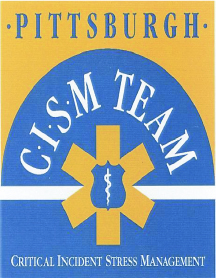Pittsburgh/Allegheny County Critical Incident Stress Management (CISM) Team is composed of local professionals who volunteer their expertise to help and helpers in Public Safety, Medical Professionals, those within the Communications field (911-dispatchers) who have been recently exposed to a critical incident or event. EMS, Fire, Police, medical staff such as Nurses, Doctors, PA’s as well as Industrial event’s who are healthcare providers are the primary focus of the team’s response. Our service is free, and we respond to Emergency Service Stations, Fire Stations, Police Stations, Hospitals and Clinics or Behavioral health institutions. Our 24-7 hotline is 412-647-CISD. All interactions are confidential, and our team may perform a one-on-one, or an entire group of responders as requested or deemed necessary. Arrangements will be made to secure a CISM team response as deemed necessary or available.
If you are experiencing life threatening symptoms or a urge to harm yourself or others you should call 911 and/or go to the closest Emergency Department.
Critical Incident: “Any situation faced by emergency services or hospital personnel that causes them to experience unusually strong emotional reactions which have potential to interfere with their ability to perform their duties.
Our CISM Team Responders are all trained and members of ICISF- International Critical Incident Stress Foundation utilizing the Dr. Jeffery T. Mitchell Model of crisis intervention. Our Mission was developed to provide debriefings and defusing following a critical incident to any public safety, hospital, communications and industrial personnel requesting assistance. The focus of this service is to minimize the harmful effects of job stress, particularly in crisis or emergency situations. As such, the highest priorities for the team are to maintain confidentiality and to respect the feelings of individuals involved.
Allegheny County/Pittsburgh CISM team is associated with the Allegheny County Emergency Medical Services Council and is proud to be a member of the Emergency Responders within Allegheny County. We do offer mutual aid to other counties on a case-by-case basis and are members of the State of Pennsylvania Emergency Health Services Council (PEHSC) CISM Responders Committee and follow the ICISF guidelines for response. We belong to the International Critical Incident Stress Foundation and follow the guidelines set-forth by this governing body.
What Defines A Critical Incident?
Anyone who has experienced trauma, or a catastrophic event may benefit from CISD. Author and researcher, Joseph A. Davis, PhD, identifies the following events and situations as “critical incidents,” all of which may be helped with this type of stress debriefing:
- Sudden death
- Incidents involving children
- Serious injury
- A threat to an individual’s physical and/or psychological safety and well-being
- A distressing situation or event that profoundly changes or disrupts an individual’s physical or psychological functioning
Source: rawpixel.com
Individuals who endure any of the above-mentioned incidents are likely to experience a menagerie of long-term and short-term emotions, symptoms, and reactions, which we’ll cover later in this article.
Recognizing and accepting the need for help following a traumatic event can lead to healing and restored hope. CISD by a trained professional helps individuals process traumatic experiences in a one-on-one or group settings. Stress debriefing also allows the trauma survivor to reflect on the incident’s impact.
CISD provides a bridge from the traumatic event to hope, healing, and recovery by giving the survivor a voice, offering closure, and allowing the individual to live with a restored sense of security and overall well-being.
Symptoms And Reactions That May Require Critical Incident Stress Debriefing
According to Davis, trauma reactions are quite common among survivors. Short-term reactions are sometimes referred to as “cataclysms of emotion,” which is a good description of the wide range of emotions an individual may experience.
Common emotional responses include:
- Shock
- Denial
- Anger
- Rage
- Anxiety
- Moodiness
- Sadness
- Sorrow
- Depression
- Confusion
- Blame
- Shame
- Humiliation
- Guilt
- Grief
- Frustration
- Fear
- Terror
- Hyper vigilance
- Paranoia
- Phobia
- Suicidal idealization
- Homicidal idealization
